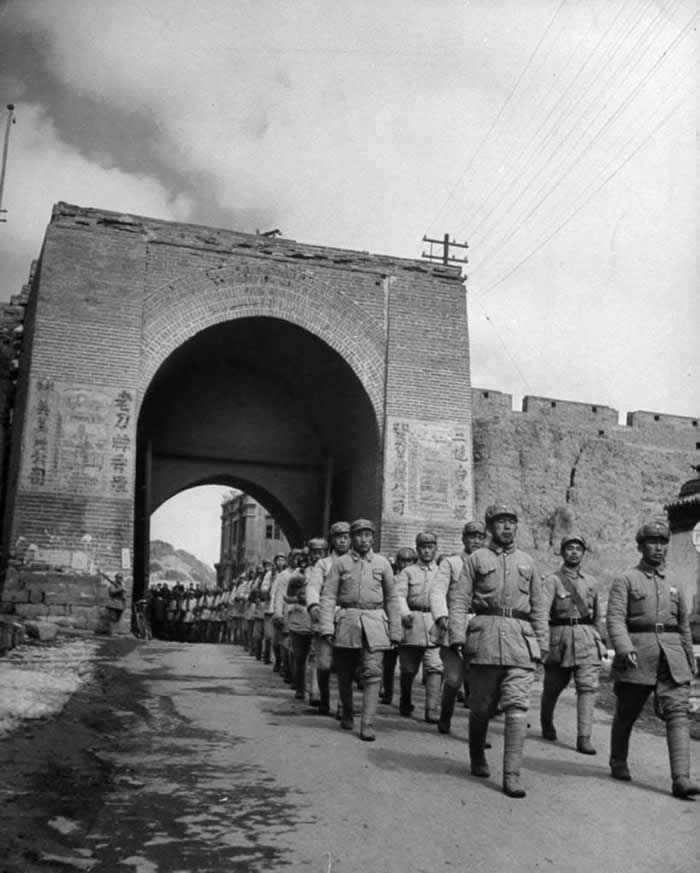 |
| Communist Soldiers at Great Wall of China during Chinese Civil War. |
Japan's unconditional surrender on August 14, 1945, ended World War II. China was Japan's first victim and had suffered eight years (since 1937) of devastating warfare on its soil. In 1945 its economy was in ruins, while about a fifth of its population awaited resettlement.
While the Nationalist, or Kuomintang (KMT [Guomindang]), government and its army, led by Chiang Kai-shek, had borne the brunt of the fighting, the war had given the Chinese Communist Party (CCP) unprecedented opportunities for growth, reflected in the explosive expansion of its forces from around 30,000 men in 1937 to 1 million regular troops and 2 million militiamen in 1945.
Mao Zedong (Mao Tse-tung) immediately ordered his troops, called the People's Liberation Army (PLA), to seize land and equipment from surrendered Japanese forces. When Soviet forces evacuated Manchuria (China's Northeastern Provinces, which had been the Japanese puppet state Manchukuo) in 1946, prior notification of the CCP enabled the PLA to seize most of the land and arms left by Japan in that region also.
  |
On the other hand, Nationalist forces were scattered along many battlefronts and less favorably disposed to take control of land from the defeated Japanese despite U.S. aid in providing transportation.
To forestall civil war, Chiang invited Mao to negotiate in the wartime capital Chongqing (Chungking) with the mediation of U.S. special ambassador George Marshall. An agreement was signed between the two Chinese leaders in January 1946 that included the calling of a Political Consultative Conference to form a coalition government and to form a national army.
 |
| Chinese Red Army soldiers march on Shanghai in 1949 |
However, the two sides' irreconcilable goals led to resumption of a bitter civil war. The CCP also refused to participate in a KMT-convened national assembly to write a constitution. Realizing his failure to mediate a peaceful settlement, President Harry S. Truman recalled Marshall in January 1947 and appointed him secretary of state. The United States then washed its hands of events in China.
The Nationalists won most victories in the early phase of the civil war, even capturing the CCP capital Yan'an (Yenan) in March 1947. However, the tide turned in mid-1947, which Chiang's resignation in January 1948 and a change of command to his vice president Li Zongren (Li Tsung-jen) failed to stem.
On October 1, 1949, Mao proclaimed the establishment of the People's Republic of China, while the KMT government and remnant KMT forces fled to Taiwan, where the Republic of China remained.
   |
The outcome of the Chinese Civil War was due to Communist military victory and defeat of the KMT forces. However, many factors contributed to the outcome. World War II and China's sufferings, the ruined economy, high inflation, and corruption were blamed on the KMT government. The CCP capitalized on the KMT's problems and won over many people with promises of social and economic reforms.
Internationally, the CCP benefited from the support of the Soviet Union. The initial U.S. support and its later abandonment of the KMT contributed to its defeat and collapse. The outcome of the Chinese Civil War was a result of World War II in Asia and contributed to the worldwide cold war.